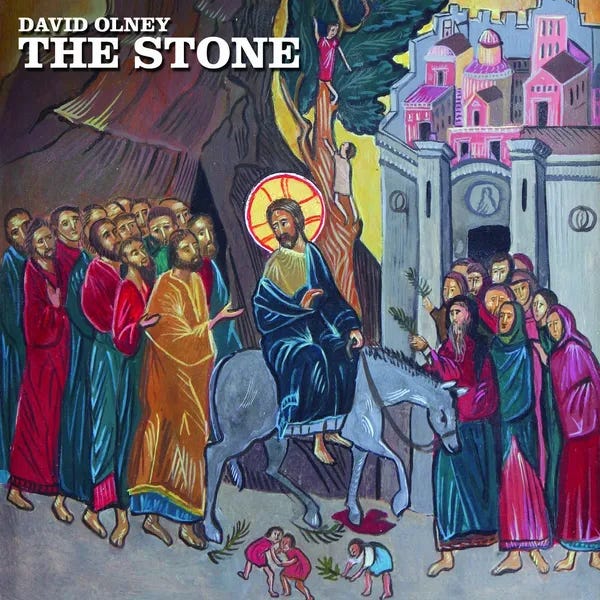March 23 was my beloved David Olney’s birthday. He would have been 76 if I’m not mistaken. The following day, March 24, was Palm Sunday. And now it’s the 25th so I’m a bit late. Ah. Well. David wouldn’t mind.
Olney’s take on Holy Week is as brilliant as anything he did. My dear friend, Bob Rasmus, brought David to his church, St. Matthew Lutheran Church in Urbana, on two different Palm Sundays. The last time David was here at the Sandwich Life in 2019 he said to Bob that they should do it again. Bob had to tell him he was retiring. Honestly, I think Bob wanted to cry. Those two events were incredibly meaningful to both David and Bob. You know, my two brilliant friends.
Both times they were incredibly powerful and moving performances and illuminated the story of Holy Week in a way this lapsed Catholic had never experienced.
Here was what Bob wrote some years ago.
So, in my retirement and pandemic quarantine, I began this Palm Sunday celebration with “Jerusalem Tomorrow,” and “Brays”, two songs from David Olney’s album, “The Stone.” The complete album takes us from the entry into Jerusalem to the cross. “From varying points of view (a con man, a donkey, a murderer and a soldier), a story is told. A picture struggles to emerge,” David wrote.
I won’t parse the songs but encourage you to listen to them as a drum roll to the events we remember as this Holy Week begins.
Olney, a recently deceased and beloved Nashville musician, performed this album on two Palm Sundays at my former church, St. Matthew Lutheran in Urbana, IL. David didn’t write religious songs as a practice, but much of his work had a deep spiritual resonance. It was part of his pondering and his restless inquiry, and “The Stone” emerged from that. He did his homework. For example, he was no doubt aware of GK Chesterson’s famous poem “The Donkey” when he wrote, “Brays”, David’s own reflection on the beast that carrying Jesus into the city. In his performance at St. Matthew, David selected and read the scripture passages that inspired each song on the album, and then he sang them. It was amazing and remains one of the highlights of my career as a parish pastor. He captivated our congregation and all those who had come to join us. It worked not because he was famous, (he actually wasn’t, not in the Nashville hit maker sense), but because he spoke to us with a fresh voice on an old story and caused us to reexamine the narrative anew. And it worked because he was honest and upfront about the mystery. “Something happened.” he says “Back there all those centuries ago. Something not easily believed or easily dismissed. Two thousand years of glory and horror, of love and hate, of beauty and violence have only made those long ago events more murky and more enigmatic. But nothing comes of nothing. Something happened.”
Something happened. We start this Holy Week from a strange place, physically isolated from our faith communities, separated from the places where we enact and celebrate and wonder, the places and communities where we tell and hear our stories, where we bring our uncertainty and our fear. And now, as the virtual embodiment of the community of saints, we will take up in our living rooms this notion that ‘something happened,’ step by step from Jerusalem, through the garden, the betrayal, the trial and the cross. We will wave our palms and mark each other’s foreheads with the dusty cross of repentance and forgiveness and we will wait . . . with Mary and the other women, with the disciples, with the world through the fear and dark uncertainty of Good Friday.
Here is the gift of these weird times, the opportunity to hear again in new ways and from new voices, the old, old story, to ponder anew what happened and what it means to us. The final track on “The Stone,” shares the observation from a Roman soldier as he addresses his superior officer after he discovers the Jesus’ tomb is empty. “Sir, there is a force at work here, beyond a soldier’s power to understand . . . . . . .Exactly what is changed I cannot say, sir, but I fear for the future of Rome.”
Nothing comes of nothing. Something happened. Something changed. Something is changing. And it does not honor the confines of pandemics or the temporary isolation of our communities. The mysterious and compelling power of this story that inspired David Olney and millions of others again transcends our everyday and commands our attention and calls us to engage the question. That was the challenge David took up, to pose the questions. He did not presume the answer.
So, let’s take it from here. As the story of Holy Week winds through the things we know all too well, suffering, death and betrayal, the answer emerges from the shadows . . . . it is what we know . . . . the old, old story that comes to us again and again, the strange good news of Easter that challenges and undermines the power of death and fear and suffering. That is what happened. Now it is for us to ponder and to lay claim and to bear witness to what has changed.
May you be blessed in your wondering in these strangest of times.
(Thanks, David. Rest in peace.)
Thank you, Bob.
Thank you, David.
Onward.
Love,
Cynthia






That was lovely. Thank you for sharing.
The Stone is the most amazing and compelling album I have ever heard. I listen to it every year!!!